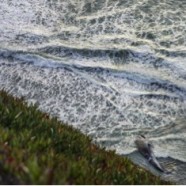Ominous before IWC (Update Oct. 28, 2016)
66th IWC – International Whaling Commission
Portoroz – Slovenia
24-28 October 2016
Ominous :
- October 27, 2016. Daly, California. The male blue whale with skull fractures runs aground at the foot of the cliffs. 65 ft in length.
On the TRAIL – Special Edition. 66th IWC – International Whaling Commission
On the Trail – Special Edition. 66th IWC
For 3 years, the NGO Robin des Bois (Robin Hood) has been publishing in French and in English the quarterly bulletin “On the Trail” on the poaching and smuggling of animal species threatened with extinction. Information come from a thousand sources, institutions, local medias and NGOs on the spot throughout the world. Each event is analyzed, related with a maximum of practical details and further developments are traced through time.
Sperm whale is the great forgotten one in the work of the IWC at Portoroz. Yet, in Europe the most prestigious, the most mysterious, the most performing, the most literary and the most coveted among cetaceans is on the front line of the casualties, of those waste-suffocated and those disorientated by vibrations and noises from offshore activities, maritime traffic and submarine explosions of ammunition.
Japan Strikes Back
Information note N°4
Whales at the International Court of Justice
The Hague, The Netherlands, 1st hearing of Japan, July 2nd – July 3rd
Japan, a country surrounded by sea, states that they “would be the last to misuse whales as resources because [they] know [they] benefit from the fruits of the sea”. Japan goes back in time explaining that they joined the International Whaling Commission (IWC) in 1951 “at a time when, amidst the devastation of war, whale meat helped prevent starvation” for a country with scarce land resources. They go even further back in time and point at the irony of history as it was whaling that forced them to interact with the international community after three hundred years of isolation. Japan stated that in the 19th century, “major maritime powers engaged in massive scale whaling demanded that Japan open up its ports to supply their whalers”. And it is this very subject, whaling, which today puts in question Japan’s compliance with the international community and international law and has brought them, for the first time, before the International Court of Justice.
Japan Strikes Back
Information note n°4
Whales at the International Court of Justice
The Hague, The Netherlands, 1st hearing of Japan, July 2nd – July 3rd
Japan, a country surrounded by sea, states that they “would be the last to misuse whales as resources because [they] know [they] benefit from the fruits of the sea”. Japan goes back in time explaining that they joined the International Whaling Commission (IWC) in 1951 “at a time when, amidst the devastation of war, whale meat helped prevent starvation” for a country with scarce land resources. They go even further back in time and point at the irony of history as it was whaling that forced them to interact with the international community after three hundred years of isolation. Japan stated that in the 19th century, “major maritime powers engaged in massive scale whaling demanded that Japan open up its ports to supply their whalers”. And it is this very subject, whaling, which today puts in question Japan’s compliance with the international community and international law and has brought them, for the first time, before the International Court of Justice.
Japan Harpoons the International Whaling Commission
During the 63rd Plenary Session of the International Whaling Commission, Japan has demonstrated its ability to debilitate initiatives for the protection of whales and distort debates on environmental threats to cetaceans. This year, a loophole in the rules of the IWC has been subtly exploited by Japanese jurists to push aside a proposed sanctuary in the South Atlantic.









